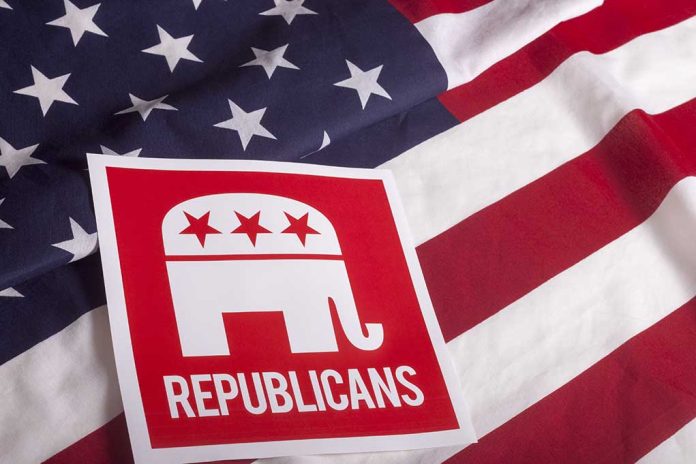
A coalition of 32 House Republicans is taking a firm stand against approving budget reconciliation without concrete evidence of $2 trillion in savings – testing the limits of Republican unity at a critical moment for implementing President Trump’s agenda.
Key Takeaways
- 32 House Republicans are demanding $2 trillion in documented savings before supporting budget reconciliation, raising the bar from the previous $1.5 trillion compromise.
- The House narrowly passed a budget resolution by a 216-214 vote, with two Republicans breaking ranks to oppose the measure alongside Democrats.
- Budget reconciliation would allow Republicans to bypass the Senate’s 60-vote threshold, making it essential for passing Trump’s tax cuts and policy agenda.
- Speaker Mike Johnson faces the challenge of balancing fiscal hawks’ demands for deep cuts with moderate concerns over slashing entitlement programs.
- Congress faces a tight timeline with Speaker Johnson aiming for passage by Memorial Day and a September 30 deadline to maintain reconciliation privileges.
Narrow Passage Sets Stage for Reconciliation Battle
The House of Representatives recently passed a crucial budget resolution by the slimmest of margins, with a 216-214 vote that keeps President Trump’s legislative agenda alive. Two Republican representatives, Thomas Massie and Victoria Spartz, joined all Democrats in opposition. This narrow victory came after House conservatives, initially opposed to the measure, flipped their positions following assurances of at least $1.5 trillion in spending cuts – a number that appears to be growing as negotiations continue.
Rep. Massie didn’t mince words in explaining his opposition, calling the resolution a “framework for financial collapse.” Meanwhile, Democrats have criticized the measure, arguing it would lead to extreme cuts in essential entitlement programs like Medicaid, Medicare, and Social Security – programs many Americans depend on.
🚨Today, 32 Members of the House of Representatives sent a letter to leadership laying out their conditions for supporting a reconciliation bill, reiterating that it should “adhere to the House framework” by including at least $2 trillion in budgetary savings or fewer tax cuts.… pic.twitter.com/HKMS3KKpeR
— CRFB.org (@BudgetHawks) May 7, 2025
The $2 Trillion Ultimatum
The stakes have now been raised with 32 House Republicans demanding $2 trillion in documented savings before they will support a budget reconciliation bill. This represents a significant increase from the previously negotiated $1.5 trillion floor that helped secure passage of the initial budget resolution. This fiscal hard line comes as Republicans attempt to balance extending the 2017 Tax Cuts and Jobs Act while addressing growing national debt concerns.
The reconciliation process is crucial for Republicans, as it allows them to bypass the Senate’s 60-vote threshold for legislation. With control of both chambers but narrow margins, Republican leaders must maintain near-perfect unity to advance President Trump’s domestic policy agenda, which includes tax cuts, increased Pentagon funding, and expanded border security.
Chamber Divisions Complicate Negotiations
Significant differences exist between the House and Senate versions of budget cuts. While House conservatives have pushed for at least $1.5 trillion in savings, the Senate initially set a much lower minimum of $4 billion. This disparity has fueled distrust among House fiscal conservatives who question the Senate’s commitment to meaningful spending reduction.
Senate Majority Leader John Thune has since acknowledged the House’s position, stating, “The speaker talked about $1.5 trillion dollars. We have a lot of United States senators who believe that is a minimum.” This suggests the Senate may be willing to move closer to the House position, though whether they’ll accept the new $2 trillion demand remains uncertain.
Clock Ticking on Trump’s Agenda
Speaker Mike Johnson has set an ambitious timeline, aiming to pass the full reconciliation legislation by Memorial Day. However, this schedule faces significant challenges given the ongoing disagreements over spending cuts and which programs to target. Additionally, Congress faces a hard deadline of September 30 to pass the bill or lose the special privileges associated with the budget reconciliation process.
President Trump has taken a direct role in the negotiations, making private calls to lawmakers and applying public pressure to bring Republicans in line. The resolution employs a “current policy baseline” tactic that doesn’t count the cost of extending the 2017 tax cuts – a move that helps mask the full fiscal impact but doesn’t satisfy deficit hawks concerned about mounting national debt.
With razor-thin margins in both chambers, every Republican vote is critical. The emergence of a block of 32 House members demanding $2 trillion in concrete savings demonstrates the significant leverage small groups hold in this process – and the challenging road ahead for Republican leaders trying to deliver on President Trump’s legislative priorities.
Sources:
House Republicans wrestle with how to make $1.5 trillion in cuts
House GOP adopts Trump budget plan after conservatives fold
Trump needs unity among Republicans to pass his budget bill. Can he get it?
32 House Republicans: Massive Reconciliation Bill Must Not Add to Deficit







